OUR PROJECTS COMMUNITY DEVELOPMENT

COMMUNITY TRANSFORMATION
About 60% of Ghana’s population lives in rural areas and this can be regarded as a channel for economic growth and development in the rural areas and the country as a whole. This trend is a great potential and when adequately harnessed can lead to sustainable rural development. To achieve this, various strategies are designed to improve the economic and social life rural dwellers. Such strategies tend to include livelihood programmes aimed at the rural poor.
Community Need Assessment Research Program (CNARP)
Community needs can be defined as the gap between what is and what should be or exist in the community. A community need can be felt by an individual, a group, or an entire community. It can be as concrete as the need for food and water or as abstract as improved community cohesiveness. An obvious example might be the need for public transportation in a community where older adults have no means of getting around town. More important to these same adults, however, might be a need to be valued for their knowledge and experience. Examining situations closely helps uncover what is truly needed, and require our Community Needs Assessment Research Program to tackle and this is basically on sanitation, health and education.
Volunteers or donor organization would have to discover their exact project through our CNARP program, the cost of the project and time to get it established for the community.
As volunteers take advantage of this opportunity of working at the hospitals and clinics around their project locations, they strategically position themselves for in-depth knowledge and practical experience as they work with and among a caliber of fully-fledged nurses and highly qualified doctors .More importantly, some volunteers will have the chance to obverse surgeries and other complicated hospital activities.
Become part of this team today to build better a community in Ghana.
Contact us info@hcdpghana.org
Community Water Projects (CWP)
Every day in rural communities and poor urban centers throughout sub-Saharan Africa, hundreds of millions of people suffer from a lack of access to clean, safe water.
Women, girls as well as school pupils especially bear the burden of walking miles at a time to gather water from streams and ponds – full of water-borne disease that is making them and their families sick.
Illness from drinking dirty water and the time lost fetching it robs entire communities of their futures. Hope is put on hold in over half of the developing world’s primary schools without access to water and sanitation.
It is of this view that HCDP GHANA had the WSS project introduce to assist communities with such difficulties most especially in the Adaklu district in the Volta Region.
You can support us by helping us establish:
- Home Water Purifier $ 60
- Rain Water Collection for a School (WSS) $ 3000
- A Borehole for a Community $ 5500
Contact us info@hcdpghana.org
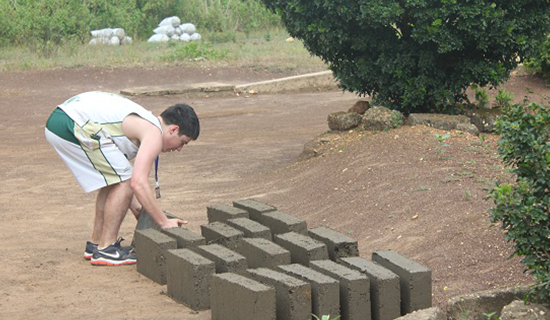
Rural Community Toilet Project. (RCTP)
Sanitation access is a critical component to the health and well-being of communities in Ghana and most especially in the Volta Region. Poor sanitation undercuts households and communities economically. Sanitation-related diseases such as cholera or diarrhea force adults out of work and children out of school, lowering productivity and families’ incomes.
There is also a social element to sanitation access and children, women and young girls are disproportionately affected by the lack of improved facilities. Children can become injured by falling into unsafe pits, young girls stay away from schools when going through their menstrual cycle, and, along with women, they can face both perceived and real threats when they have to venture into the bush or even to public facilities late at night.
This is why HCDP GHANA has introduced Rural Community Toilet Project to assist communities with sanitation challenges. However, it’s part of our mission, and support from donor organization to build such facilities in the Rural Communities.
You can support us by helping us establish:
- 4 sitter toilet (KVIP) (2 Male & 2 Female) $ 3000
- 6 sitter toilet (KVIP) (3 Male & 3 Female) $ 4000
- 10 sitter toilet (KVIP) (5 Male & 5 Female) $ 6000
Become part of this team today to build better sanitation in Ghana.
Contact us info@hcdpghana.org
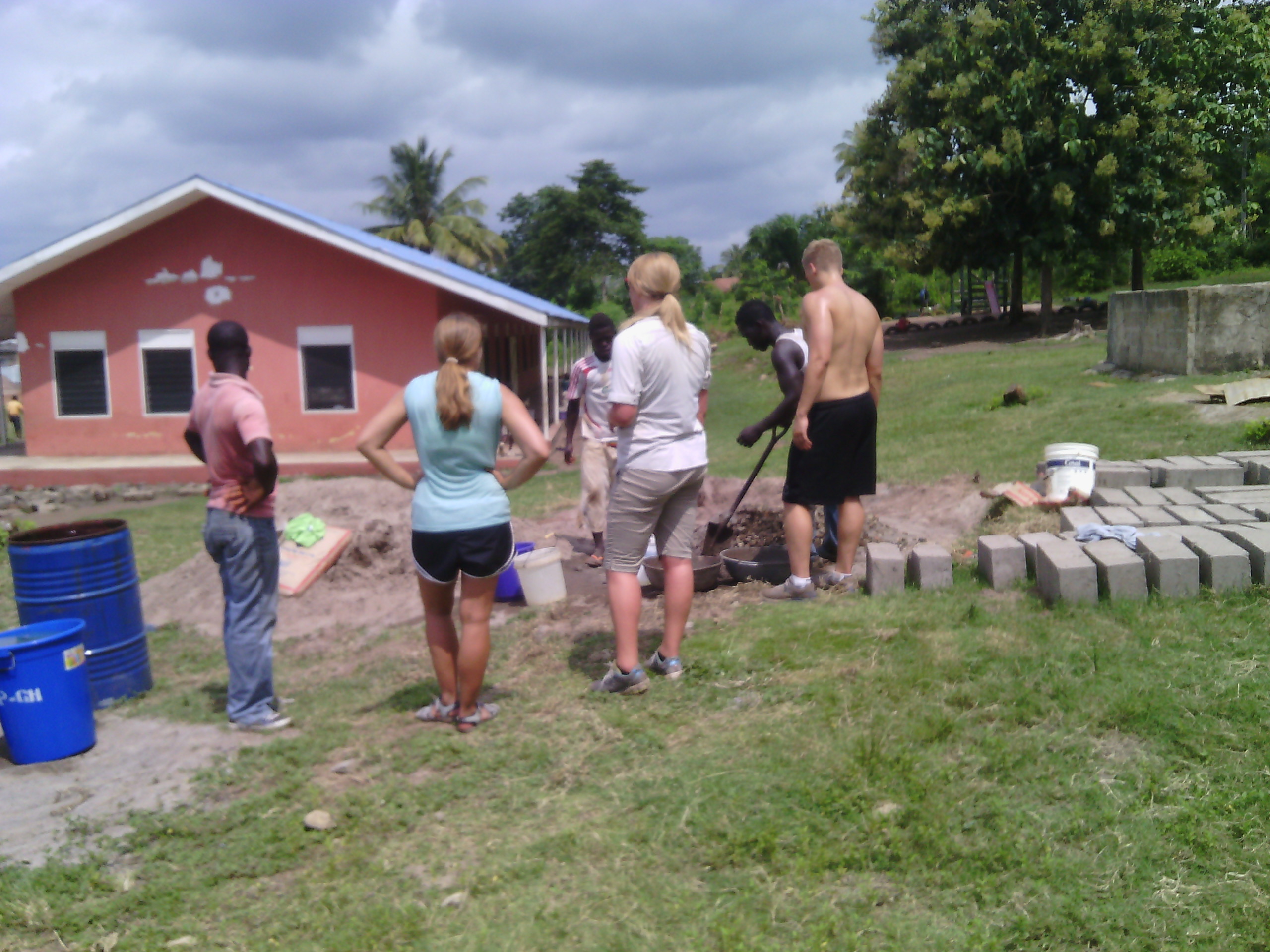
Women Empowerment Program – Youth in Bead Works
The continuous high rate of teenage pregnancy poses a lot of challenges to the nation and the life of the victims. HCDP-Ghana conducted a study in 2017/18 on the subject in the Ho West District in the Volta Region where it was discovered that the situation remains alarming in the remote villages in the district. In attempt to implement recommendations from the survey taken in collaboration with our volunteers this year, HCDP kick started the project Youths in Bead Works (YIBW-HCDP) at Dodome Avexa in 2019. The project was based on the observation from our initial survey which revealed that there is mass young female school drop outs and teenage mothers in the Dodome Avexa community in the Ho West District of the Volta Region of Ghana.
The project aims at alleviating the level of poverty among female drop-outs and teenage mothers in the community and its environs in the Volta Region (Ghana) by providing them with basic and minor professional training in beads works or the use of beads for jewelries, sandals etc. The project is expected to provide a rented housing facility for project facilitators as well as a training center for participants, female school drop-out and teenage mothers in the community. Participants will be trained for two main sessions or phases. The initial phase will give them preliminary training in the areas of bead usage for various decorations. The second stage will serve as a mastery development stage where they are made to perfect their skills in those areas so as to make revenue to cater for themselves as well as their families.
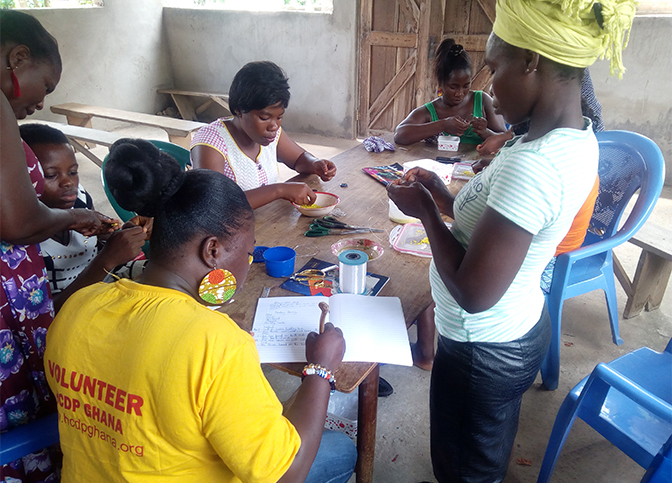
ICT LAB INSTALLATION
For the past 8 years, HCDP Ghana has been in partnership with William and Mary IT in distributing of used computers to rural community school in Ghana. Students in deprived communities see ICT as a distant dream and the need to reach out to them through this partnership. In some cases, there were a few old models which none of them was allowed to practice with. However, the inclusion of ICT in the Ghana educational curriculum has further intensified the demand on HCDP GHANA to respond to the needs of less privileged schools in the teaching and learning of the ICT component of the educational curriculum.
The project was geared to providing school citizenry with ICT skills and access to the internet, to contribute to their academic works and also promote the exploitation of ICTs as an alternative source of livelihood, especially for the youth, and for economic sustainability of beneficiary communities as a whole hence our partnership with William and Mary IT to make this possible.
Please read more from our partnership
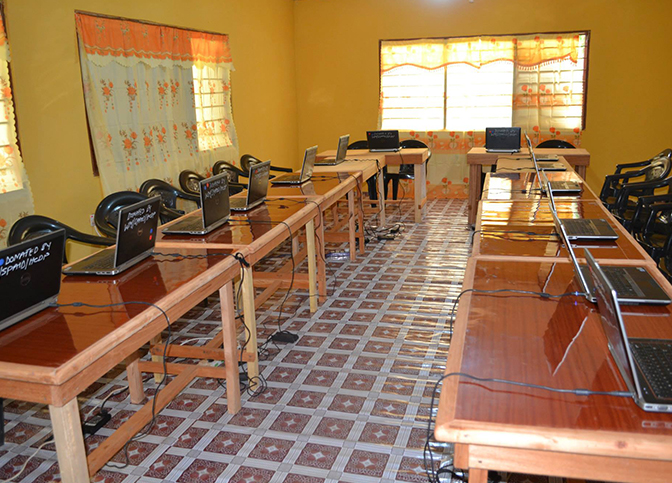
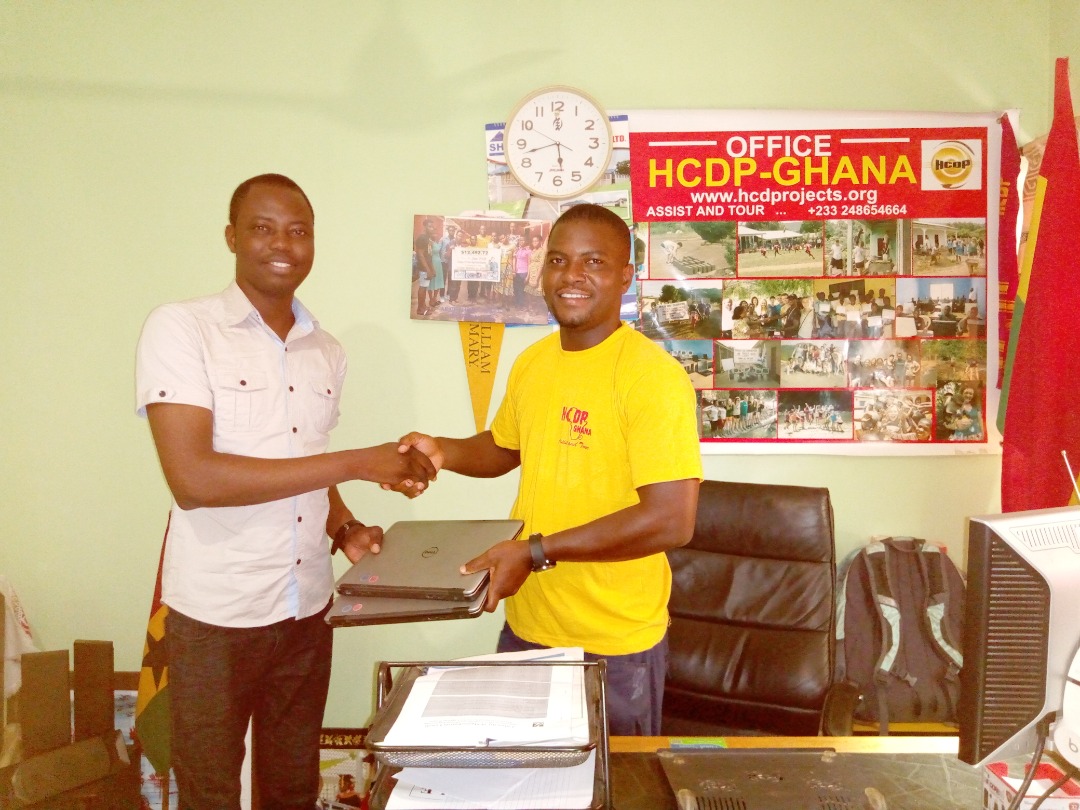
Another badge of computers presented to Adaklu Secondary School right from our office due to increase enrollment-2019
ONLINE: FIGHTING COVID-19 IN RURAL GHANA
Introduction
Coronavirus cases in Africa seems to be on the ascendancy with 27, 385 cases with which 1,297 deaths were recorded and 8,172 recoveries as at Thursday, 23rd April 2020. The situation in Ghana is becoming scarier as cases rocket geometrically from 11 positive cases on 19th of March 2020, to 1154 as Thursday 23rd April 2020. The report shows that within a month the number of cases increased by 1143. With reportage and warning from WHO to Africans to prepare for the worst and also that Africans should not assume they will not be infected but rather otherwise, HCDP GHANA is championizing the need to support 4 rural communities (in Volta Region-Ghana) with hand sanitizers, Veronica buckets, and other important items to help ensure they wash their hands on time and frequently to help prevent the spread of this world pandemic. The campaign has been launched about a month ago with a total amount raised far lower than half of estimated total amount. So far, with just 22% of amount raised, only a community has been provided with the needed items by HCDP GHANA. All these would be coupled with education on good personal hygiene and social distancing protocol
Link to the Campaign page
Responsibilities of Volunteer
- Assist to continue the campaign towards raising funds to assist our remaining 3 out of 4 rural communities in Ghana in the fight against coronavirus
- Solicit funds from friends and family towards the fight against Covid-19 in rural communities, a project initiated by HCDP GHANA.
- Assist in soliciting for funds from organizations or institutions to support HCDP’s fight against Coronavirus in rural communities in Ghana.
- Recommend measures to help strengthen HCDP’s campaign positions and strategies towards the fight against coronavirus in Ghana.
- Submit reports on updates and measures undertaken individually on weekly basis towards achieving the responsibilities above to management of HCDP GHANA.
Skills of Volunteer
- Ability to connect with donors (individuals or organizations) and project supporters towards raising funds.
- Power over social media advertisement or digital marketing: ability to use the various social platforms for advertisement and fund soliciting.
- Ability to connect with donors (individuals or organizations) and project supporters towards raising funds.
- Grant writing skills Program Fee: Participant are to pay and upfront participation fee of $250 with the following breakdowns: $200 to directly fund support the project whilst $50 goes into administrative cost and online certification for volunteers after successful completion. Duration: May to September, 2020 (Subject to review).
Certification: Participants will be awarded certificates signed by HCDP Director-Ghana and the District Chief Executive of the Ho Central Constituency where the communities are located.
Type of Online Work: Grant Research / Grantwriting
Desired Hours per Week: 1-5 hours per week
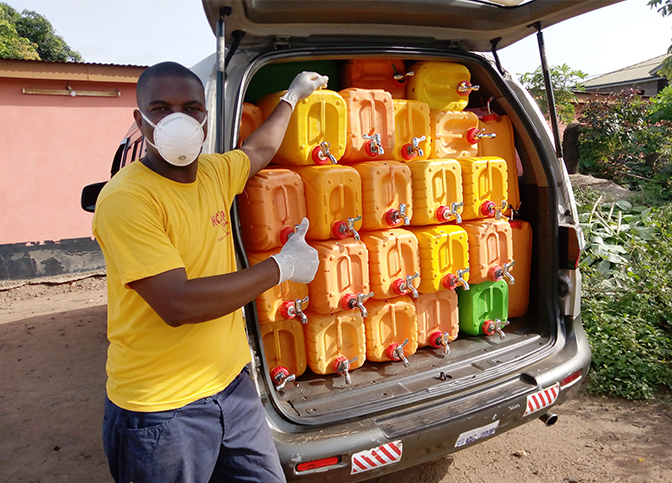
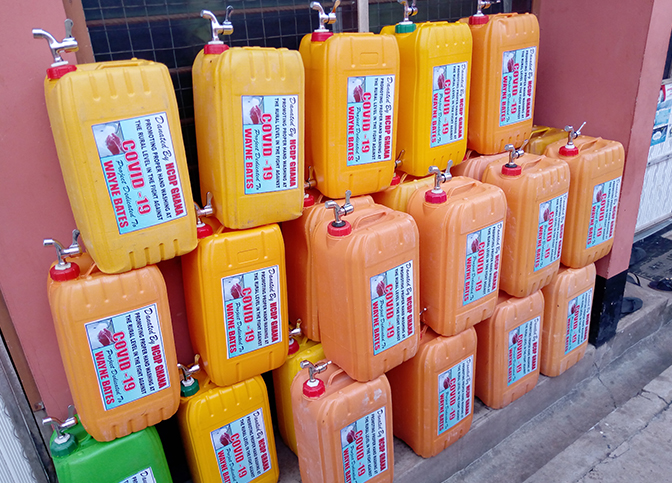
Our achievement on one community and its surrounding villages
ONLINE: YIBW PHASE 3 AND MARKET INCLUSIVE
Introduction
HCDP-Ghana successfully implemented phase one and two of a project dubbed ‘Youth in Bead Works (YIBW-HCDP) a women empowerment project at Dodome-Avexa in the year 2019/early 2020. The project aimed at alleviating the level of poverty among female drop-outs in the community and its environs in the Volta Region (Ghana) by providing them with professional training in beads making and the use of beads for sandals, necklaces bracelets etc. The first-two phases provided preliminary training in the areas of bead usage for the various decorations and a mastery development stage where they are made to perfect their skills in those areas respectively. Further details of the first-two phases which grant was won for from 3 entities namely: Lawson Debre -Gold Sponsor, Omprakash -Silver Sponsor and Vivien and Heather as Bronze Sponsors can also be seen from our blog via:
https://www.omprakash.org/blog/sustainability-of-our-women-empowerment-project-1
The third phase of the project which is yet to kick start before the deadly coronavirus set-in include providing start-up capital for the beneficiaries in the short run and also securing a permanent market place for both our current and future trainees as well as sustainable project for HCDP GHANA. HCDP GHANA seeks the services of an online volunteers that can solicit for funds as well as get some already markets for its already produced beads specifically to boost our campaign so that distribution/delivery is done after coronavirus pandemic is over. Our campaign to this project has already raised 17% of its target hence calling online volunteers at this crucial time of a pandemic. Omprakash has also provided HCDP GHANA with project consultants, Mallory from USA and Tess from Kanya who have be very helpful from phase one to this point!
Link to the Campaign page
Responsibilities of Volunteer
- Assist in the campaign to raise funds to help support the phase three of the YIBW project of HCDP-Ghana
- Lease with to get pictures of produced beads products by the beneficiaries of the YIBW-project and market them with the condition that there will be delivery to those found markets after the corona pandemic is over.
- Suggest measure HCDP GHANA can adopt to help raise funds and also market the products produced by the beneficiaries.
- Recommend measures to help strengthen HCDP’s campaign positions and strategies towards the fight against coronavirus in Ghana.
- Submit reports on updates and measures undertaken on weekly basis towards achieving the responsibilities above to management of HCDP GHANA.
Skills of Volunteer
- Ability to market products specifically beads handy-works such as wrist band, necklaces, ear rings, sandals etc.
- Power over social media advertisement or digital marketing: ability to use the various social platforms for advertisement and fund soliciting
- Ability to connect with donors (individuals or organizations) and project supporters towards raising funds.
- Marketing grant writing skills
Program Fee: Participant are to pay and upfront participation fee of $300 with the following breakdowns: $200 to directly support the project whilst $100 goes into administrative cost and online certification for volunteers after successful completion
Duration: May to September, 2020 (Subject to review)
Certification: Participants will be awarded certificates signed by HCDP Director-Ghana and the Assembly member of the Dodome-Avexa community where the beneficiaries are residents of.
Type of Online Work: Grant Research / Grantwriting
Desired Hours per Week:1-5 hours per week
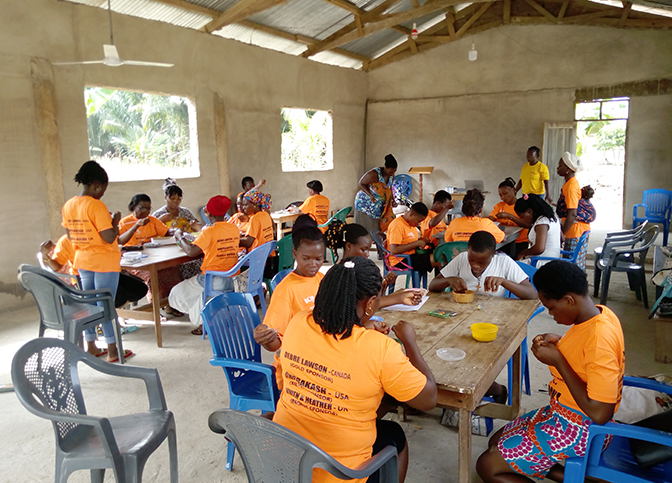
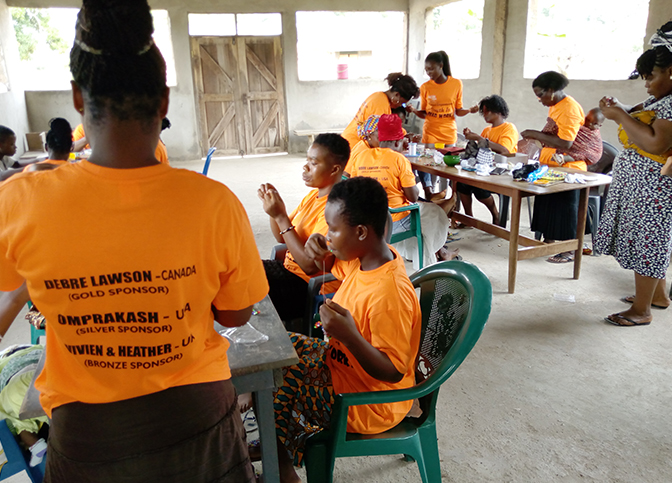
Our achievement on one community and its surrounding villages
